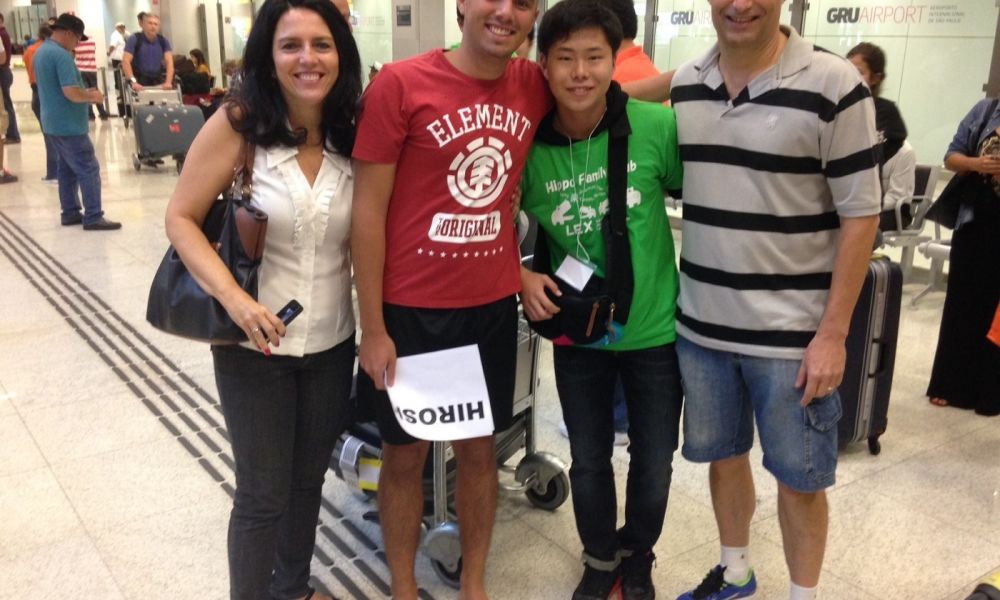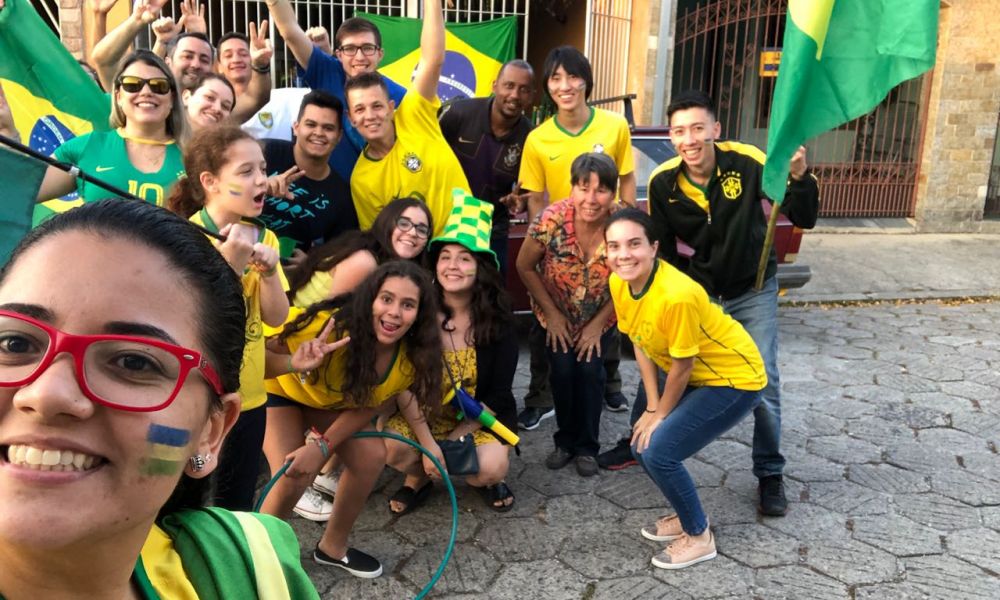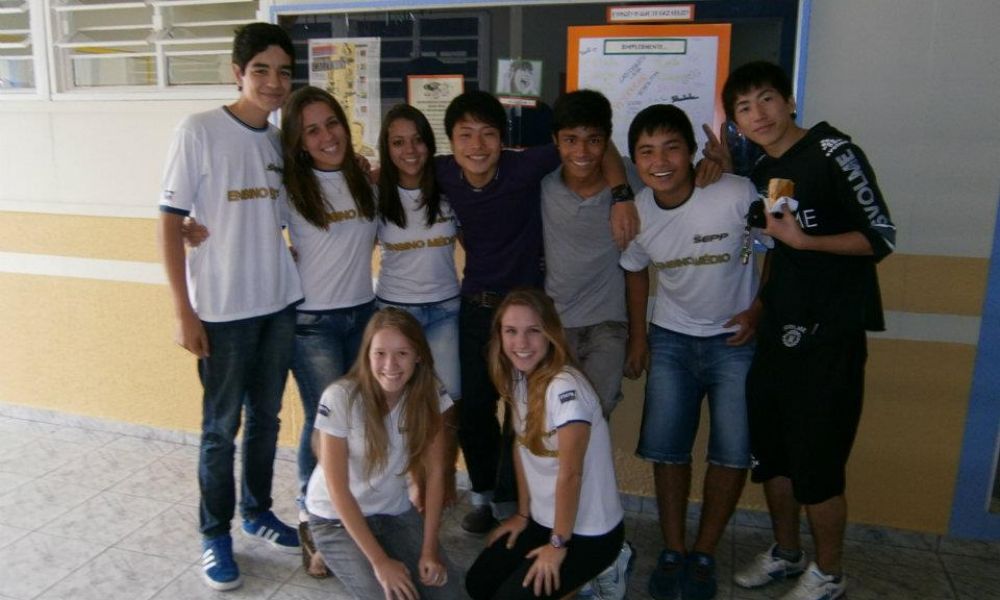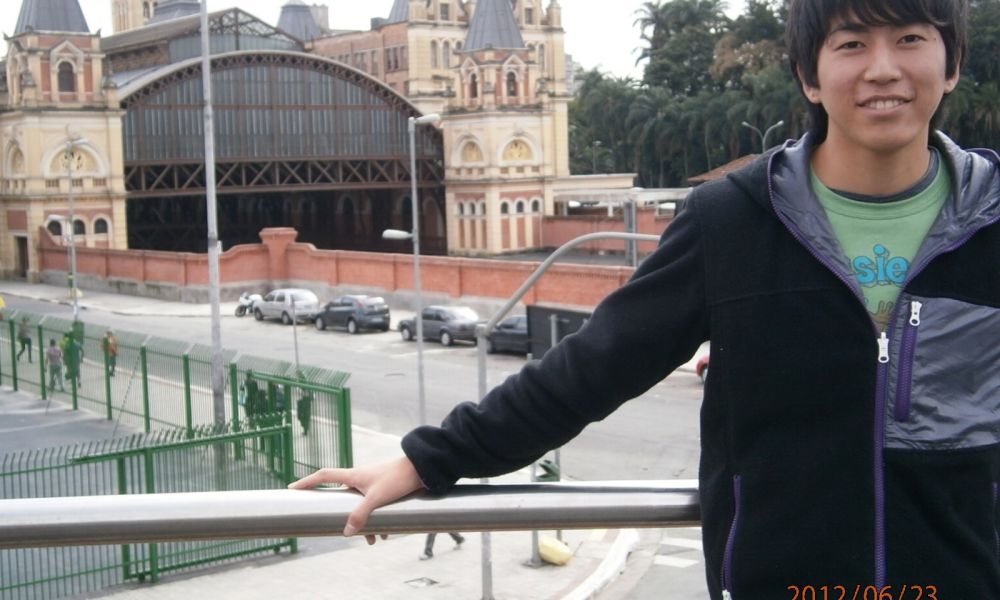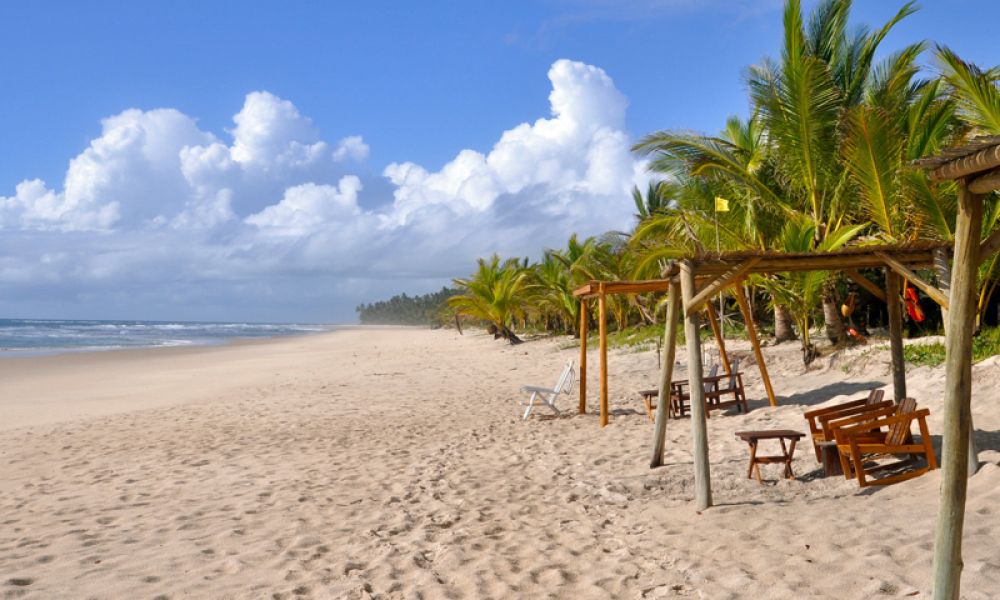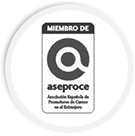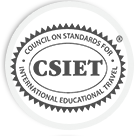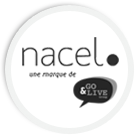Embark on a Portuguese-learning journey with the Nacel High School Exchange Program in Brazil! Learn Portuguese to fluency and dive into the Brazilian culture. You do not just study Portuguese, you live it!
Immerse yourself in the culture, values, and traditions of this beautiful country. A Brazilian host family warmly welcomes you as a new family member and accompanies you at all times during this immersive experience in Brazil.
So, if you're looking to study abroad and explore Portuguese, choose a High School Study Abroad in Brazil.
Next possible start dates: July 26. Apply now!
Student Exchange in Brazil: Study in a local high school and live with a Brazilian host family
Nacel's student exchange programs in Brazil offer you the unique opportunity to live with a Brazilian family and study at a local high school. Like just another Brazilian teen!
If you have some knowledge of Portuguese and want to improve your Portuguese skills as much as possible, choose a High School Study Abroad in Brazil. Live an unforgettable experience and discover the educational system of South America's largest country.
What should I expect from this High school exchange in Brazil?
- You can study one trimester, a semester, and up to a complete academic year at a Brazilian High school.
- You will live with Brazilian host families who will welcome you as a new family member.
- As soon as you arrive in the country, you will attend an orientation session with your local coordinator who will provide you assistance and support throughout your program. We will keep your parents informed of your adventures in the country.
Your High School in Brazil
You attend a local Brazilian High School interested in welcoming international students for an exchange program in Brazil. You attend all the subjects your Brazilian classmates attend at this age. They are conducted in Portuguese so you are fully immersed in the language.
- Portuguese Language Arts: This is a Portuguese language arts course not a course of Portuguese for foreigners. We include a 10-hour introduction course to help you with your Portuguese!
- Brazilian Literature,
- English Foreign Language,
- History
- Geography
- Chemistry
- Physics
- Maths
- Biology
- Arts
- and Physical Education.
Brazilian teens go to either morning schools (7:30 am to 1:30 pm) or afternoon schools (from 1 pm to 7 pm).
Note that you may need to wear a uniform: sometimes it is an entire specific uniform but sometimes it is just a specific t-shirt; it depends on schools!
Graduating from a high school in Brazil is unfortunately not possible.
Important Information: Nacel cannot guarantee that you will be able to obtain a report card from your local Brazilian high school. It will depend on your performance and school decisions. However, the school should be able to provide you with a certificate of attendance.
Your Exchange Program Duration
Academic year: February to December
Semester:
- January to July
- July to January
Visa information: Information regarding visas is provided after acceptance into the program. To learn more, visit the Embassy of Brazil website.
Sign up for this authentic exchange program in Brazil with Nacel!
Teenage life in Brazil includes extracurricular activities that Brazilian students attend at school or in local clubs, such as sports, language courses, Arts, Music, Theater, gym, etc.
Popular sports include Soccer, or Futebol, Futsal (court soccer), Futebol de Areia (Beach Soccer), and Futvolley (a mix of soccer and volleyball)!
Volleyball and Volley de Praia (beach volleyball) as you know are two sports Brazilians appreciate! Discover the fascinating Capoeira!
Other sports usually offered are Basketball, Handball, Swimming, Aerobics, Cycling, Running, Tennis, Dance, and Martial Arts (mostly Judo, Karate, Jiu-Jitsu, and Tae-Kwan-Do).
We encourage you to sign up for extracurricular activities: you make new friends, practice Portuguese in a different environment than the classroom, stay fit and busy, and build strong relationships with teens from different backgrounds. This is an additional value to your exchange program in Brazil.
During your High School Study Abroad in Brazil, you will live with a vetted host family who provides you will accommodation and meals.
Your journey starts by meeting your Brazilian host family who opens their home and heart to you. Your Brazilian host family does not just host you and provides you with room and board. They introduce you to the family culture and Brazilian life and are your passport to this immersive Brazilian adventure!
They are your family away from home and guide you throughout the experience with the support of your local coordinator!
You create memories of a lifetime and build a strong relationship with your Brazilian family for the rest of your life.
Travel & Orientation
Once you land in Brazil, you are warmly welcomed by your host family and/or your local coordinator. Your local coordinator remains in touch with you throughout your stay in Brazil and is a support worker: you can rely on this staff to help you at any time during your exchange in Brazil. Your local coordinator will conduct an orientation so that you settle in in your new life and can start this adventure with all the necessary information and tips!
High School Exchange in Brazil
* Costs in USD per participant
High School Abroad in Brazil:
- Trimester Abroad Brazil
- Semester Abroad Brazil
- School Year Abroad Brazil
- High School Summer Abroad Brazil
Start Dates:
- January 2026 start
- July 2026 start
💰 What's Included in the Price?
- 20+ years of experience providing high-quality study-abroad programs
- Processing of student applications
- Host school placement (tuition fees not included)
- Host family selection and placement including room and board with the host family
- Airport pick-up and transfer from/to the local airport on arrival and departure (students arriving to GRU have an extra cost)
- On-site orientation given by the Area Rep with an introduction to Brazilian family, school, and cultural life
- 10-hour Portuguese language class
- Necessary documentation for the student to obtain a student visa for Brazil and visa guidance
- Access to an in-country support team, and Nacel Student Support staff
- Regular Progress Feedback
- Support, assistance, and 24/7 Hotline
🚫 What's Not Included?
- Round-trip international airfare
- Non compulsory insurances (luggage lost, flight delay etc.)
- Visa, passport, immigration, and medical exam fees
- Extra activities and excursions organized by the school or others
- Extra language courses
- Local transport (also from and to school)
- Personal phone charge or other personal items (clothing, toiletry items, Sim Card, etc)
- Personal expenses and spending money
- Transfer from GRU airport to host city (190 USD one way)
- Compulsory Medical, Civil Liability, and Emergency Repatriation Travel Insurance
- laboratory fees, activity fees, and school supplies not provided by the local high school including uniform (when required), school books, stationary, physical education or sport activity fee; and commuting costs, if any, to and from school.
For this High School Abroad in Brazil, you:
- must be between 15 to 18 years old. 19-year-old students and graduates may be considered on a case-by-case basis, inquire!
- need to be interviewed by our counselor before being accepted for a High School Program in Brazil.
- need to have a minimum of one year of Portuguese study (either in a face-to-face language class or online).
- need to have good grades at school.
Motivation and Enthusiasm are an absolute requirement for your foreign exchange student in Brazil!
Frequently Asked Questions
~~~~~~~~~~
Here are some tips for you:
1) Communicate! Please talk about everything and be open with your host family. For example, tell them about your school life, where you are going, and what time you will return. Make a point to discuss host family rules, and schedules (such as when you can take a bath) right away.
2) Ask Questions. When in doubt, ask your host family for help. You might not understand everything at first, but your host family wants to help. You might feel less independent in the beginning, but these feelings will go away eventually. Don’t hesitate, or feel it is impolite to ask many questions. This is normal.
3) Discuss Issues. Sometimes there will be small problems adjusting for you and your host family. It is important to talk about these frustrations even if they seem small. Always talk to your host family first about any problems. If you become sick, tell your host family right away.
4) Allow adjustment time. You may form an image of your host family within the first couple of days that isn’t accurate. Your host family might take you sightseeing, fix special foods, or be extra polite when you first arrive. Little by little, you and your host family will feel more comfortable around each other and act naturally.
5) Participate in Family Life. Don’t hide in your room. If you are feeling homesick, hiding in your room will only make it worse. Have fun with your host family, and share in evening or weekend activities.
6) Keep an Open Mind. Look at differences as new and fun experiences. This is your chance to try many new things that you might not be able to do in your home country. Take advantage of the opportunity!
7) Be polite and friendly. This is important. You might not talk very much with your family in your home country, but if you shut yourself off from your host family they will assume that you are homesick or unhappy. When you like something, be sure you tell them. A “thank you” and a smile can go a long way!
8) Help with Housework and Chores. Seriously, you would be surprised at how much an offer to do the dishes will mean to your host family.
Remember, your host family will also be nervous, especially if it is their first time hosting. They worry about whether you like the food or their family. If you are open and friendly, you will help to put them at ease. At the end of your stay, you will probably find that you do not want to leave!
The benefits of studying abroad are multiple.
Here are some that you may want to consider:
- Develop and improve new language skills.
- Immerse yourself in a new culture and way of living.
- Become more independent.
- Gain a new perspective of your country, the destination country and the world while appreciating diversity.
- Find a family, make new friends and establish international friendships that could last a lifetime.
Usually, students bring a small gift from their home country to their host family but it is not mandatory at all. It should not be a high-value gift but something typical of your country and culture.
If your child plans on taking electronic devices with him/her, you should check if he/she will need an adapter and buy one if he/she does.
A small, two-entry language dictionary may be very useful (must-have!), as well as a travel book of the city/area, with a plan.
Participant must be aware that they are responsible for the handling of their luggage. We advise you to travel with light luggage.
Aside from essential documents (passport and travel information), school supplies, and a photo album from home, we suggest reviewing the local weather for the time your child will spend abroad so he can adapt his clothes and bring what is necessary.
Take your most important belongings with you on board (hand luggage): necessary drugs if you are sick on board or have medical treatment; acceptance letters, passport, visa papers, and insurance certificate, details of your host family and/or of the person who is supposed to pick you up at arrival, emergency phone number for the program, electronic devices like camera and music devices, jewels if any, glasses, etc.
Students attending a High School exchange program are expected to follow the host family and school rules and attend school daily.
They are not allowed to drive, smoke, drink alcohol, or use drugs during the time he/she participates in the exchange program.
The student will be helped by our local representative and his/her host family to visit a local doctor and get the necessary medical treatment. If hospitalization, surgery, or repatriation is needed, the insurance should be first informed.
If necessary, our team at the headquarters located in France, which delivers a 24-hour emergency service, 365 days a year, may assist you. The phone number of this service will be given to you before the student’s departure.
Please be sure to have a medical insurance. We can provide you with one, for an additional cost. Ask us for more information about the insurance policy!
Your child’s trip abroad will be a rewarding experience, but he/she has to be ready to change his/her way of life for some time and toadapt to the host family.
Here aresome tips to check if your child is ready for this challenge:
- He/She is the one who wants to participate in thestudy abroad program. Never force your child to go abroad if he/she doesn’t want to! At best he/she won’t enjoy his/her trip as much as if he/she would have decided him/herself. At worst he/she will be repelled by his/her language studies back home!
- He/She showsinterest and curiosity about the language or the countryhe/she is going to visit.
- He/She isindependent enoughto be able to cope with problems that may occur (flight delays, loss of luggage, waiting time…), or with homesickness (has he/she already been far away from home? How did he/she cope with that?)
- He/She ismature enough. In some of our programs, supervision is high, and activities are planned all day long. But in others, students are less supervised and must be mature and responsible enough to behave according to the program’s rules and to find occupations.
If you are not sure if your child is ready or not, we can advise you!Meet the teamof Nacel!
Homesickness may happen to everyone, even people who have already been abroad without having faced any problems before. To prevent homesickness, keep in touch with your child, but not too much/too often (see below), and follow our preparation tips. If it is your child’s first experience abroad, a short-term experience would probably be the best choice for you to make, so that your child can “test” himself/herself.
The purpose of most of our programs is the immersion in another country’s language and culture. During the first days, it is normal if your child feels a bit homesick, and too frequent communication with his/her natural parents could delay his/her integration into the host country.
You can suggest she/he get involved in local activities, clubs, and sports to help her/him make friends with similar interests.




